On New Year’s Eve, 31 December 2020, French film actor, director, and writer Robert Hossein (1927) has passed. He was generally cast as a tough guy beside gorgeous actresses such as Brigitte Bardot, Sophia Loren, and Marina Vlady. Hossein is most famous though as Michèle Mercier's husband in the wildly popular Angélique film series of the 1960s. He died, one day after his 93rd birthday, of complications from COVID-19.

East-German postcard by VEB Progress Film-Vertrieb, Berlin, no. 1840, 1963. Robert Hossein in La liberté surveillée/Provisional Liberty (Henri Aisner, Vladimír Vlcek, 1958).
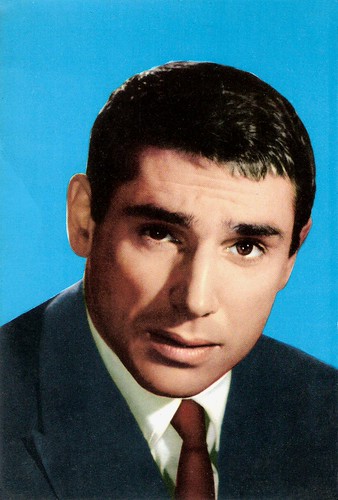
Spanish postcard by Postalco, Barcelona, no. 21/2. Photo: Unifrance Film.

Romanian collectors card by Operativa "Fotografia".
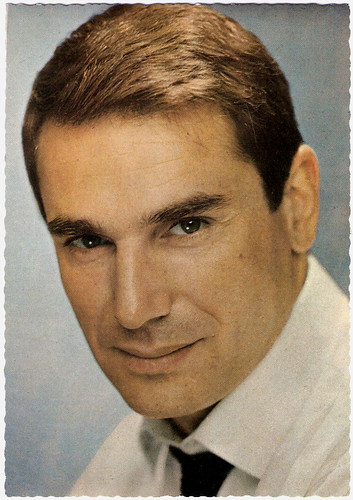
French postcard by E.D.U.G., no. 470. Photo: Sam Lévin.
Rififi
Robert Hossein was born as Robert Hosseinoff in Paris in 1927. He was the son of Aminollah (André) Hossein, a French orchestra conductor and composer of Persian-Azeri descent, and Anna Minevskaya, a Jewish comedy actress from Kyiv.
Robert was trained at René Simon's acting school. He laboured away as actor/director with the legendary Theatre Grand Guignol in Montmartre, then spent several years on the ‘legitimate’ stage.
He made his first film appearance in a bit part in Les souvenirs ne sont pas à vendre/Sextette (Robert Hennion, 1948) with Martine Carol, and he had his breakthrough with the classic Film-Noir Du rififi chez les hommes/Rififi (Jules Dassin, 1955) as a slightly sadistic drug-addict. The role of the jaded criminal stuck with him in the coming decades.
Hossein also started directing with the thriller Les salauds vont en enfer/The Wicked Go to Hell (Robert Hossein, 1956) in which he co-starred with his wife, Marina Vlady. The film was based on a play by Frédéric Dard whose novels and plays went on to furnish Hossein with much of his later film material such as the Film Noir Toi... le venin/Blonde in a White Car (Robert Hossein, 1958), in which he again co-starred with Vlady, and with her sister Odile Versois.
Wikipedia: “Right from the start Hossein established his characteristic trademarks: using a seemingly straightforward suspense plot and subverting its conventions (sometimes to the extent of a complete disregard of the traditional demand for a final twist or revelation) to concentrate on ritualistic relationships. This is the director's running preoccupation which is always stressed in his films by an extraordinary command of film space and often striking frame compositions where the geometry of human figures and set design is used to accentuate the psychological set-up of the scene. The mechanisms of guilt and the way it destroys relationships is another recurring theme, presumably influenced by Hossein's lifelong interest in the works of Dostoyevsky.”
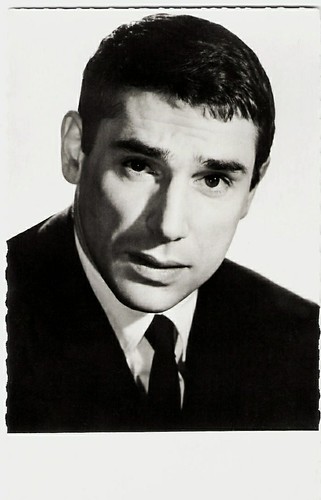
French postcard by Editions P.I., offered by Les Carbones Korès Carboplane, no. 906. Photo: Sam Lévin.
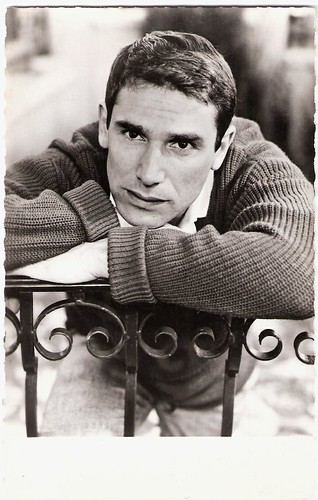
French postcard by Editions P.I., Paris, no. 949. Photo: Studio Bernard & Vauclair.
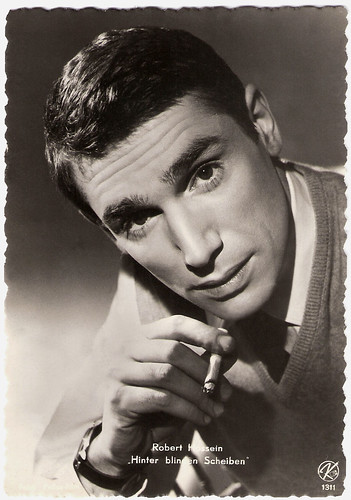
Austrian postcard by Kellner-Fotokarten, Wien, no. 1311. Photo: publicity still for Méfiez-vous, fillettes!/Good Girls Beware! (Yves Allégret, 1957).
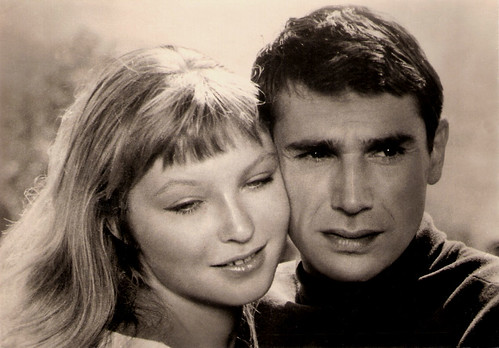
East-German postcard by VEB Progress Film-Vertrieb, Berlin, no. 1842, 1963. Retail price: 0,20 DM. Publicity still for La liberté surveillée/Provisional Liberty (Henri Aisner, Vladimír Vlcek, 1958) with Marina Vlady.
Unashamedly melodramatic frameworks
As a director, Robert Hossein had some modest international successes with films like Le vampire de Düsseldorf/The Vampire of Dusseldorf (Robert Hossein, 1965), but he was much singled out for scorching criticism by the critics and followers of the Nouvelle Vague for the unashamedly melodramatic frameworks of his films.
The fact that he was essentially an auteur director with a consistent set of themes and an extraordinary mastery of original and unusual approaches to staging his stories, was never appreciated. He was not averse to trying his hand at widely different genres and was never defeated, making the strikingly different spaghetti western Une corde, un Colt/The Rope and the Colt (Robert Hossein, 1969) and the low-budgeted but daringly subversive period drama J'ai tué Raspoutine/Rasputin (Robert Hossein, 1967) starring Gert Fröbe.
However, because of the lack of wider success and continuing adverse criticism, Hossein virtually ended his film directing career in 1970 and concentrated on the theatre where his achievements were never questioned.
However, in 1982, he directed the film adaption of Victor Hugo’s classic literary masterpiece, Les Misérables (Robert Hossein, 1982) with Lino Ventura as Jean Valjean.
James Travers writes in his review at French Films: “The film’s exceptional production values are enhanced by Hossein’s own stylised approach, which gives the film a sense of authenticity and surprising modernity.”
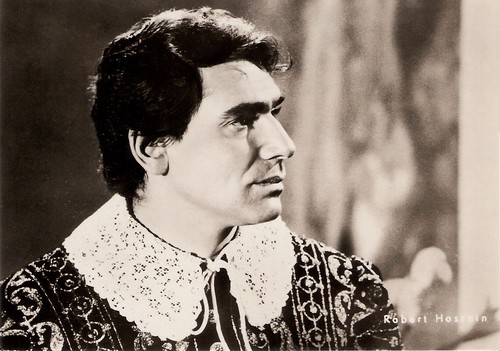
East-German postcard by VEB Progress Film-Vertrieb, Berlin, no. 32/71. Retail price: 0,20 M.
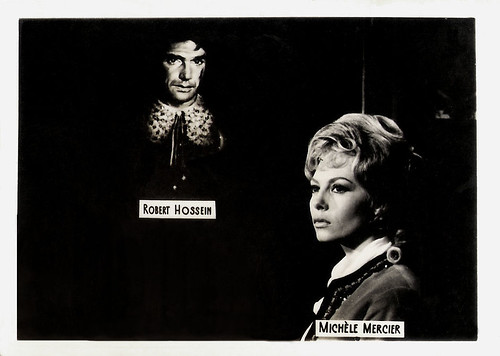
Romanian mini-card. Hossein with Michèlé Mercier in one of the Angelique films.

Romanian postcard by Casa Filmului Acin, no. 277. Photo: publicity still for Angelique et le sultan/Angelique and the Sultan (Bernard Borderie, 1968).
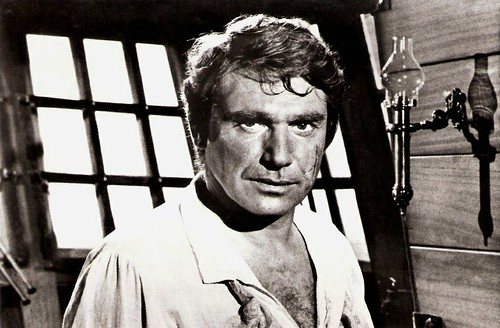
Romanian postcard by Casa Filmului Acin. Publicity still for Indomptable Angelique/Untamable Angelique (Bernard Borderie, 1967).
Angélique
Robert Hossein’s most famous role was as Michèle Mercier's husband Jeoffrey de Peyrac in the historical romance/adventure Angélique, marquise des anges/Angélique (Bernard Borderie, 1964) and its four sequels.
Other films in which he appeared were Crime et châtiment/Crime and Punishment (Georges Lampin, 1956) starring Jean Gabin, Madame Sans-Gêne (Christian-Jaque, 1961) opposite Sophia Loren, and the Marquis de Sade adaptation Le vice et la vertu/Vice and Virtue (Roger Vadim, 1963) with Catherine Deneuve.
In the 1970s and 1980s, he played opposite Jean-Paul Belmondo in police thrillers like Le Casse/The Burglars (Henri Verneuil, 1971) and Le professionnel/The Professional (Georges Lautner, 1981). He also appeared opposite Brigitte Bardot in one of her last films, Don Juan ou Si Don Juan était une femme.../Don Juan (Or If Don Juan Were a Woman) (Roger Vadim, 1973), and he was excellent as a Catholic priest who falls in love with Claude Jade and becomes a communist in Prêtres interdits/Forbidden Priests (Denys de La Patellière, 1973).
One of his most famous starring roles was as a pianist in the musical epic Les Uns et les Autres/Bolero (Claude Lelouch, 1981). In the theatre, he directed popular historical vehicles involving large sets and numerous actors. Among his later creations were 'Danton' and 'Celui qui a dit non' (Those Who Said No), a play on Charles de Gaulle and the French resistance. At the age of 72, Hossein again played romantic love scenes in a film, now with Audrey Tautou in Vénus beauté (institut)/Venus Beauty Institute (Tonie Marshall, 1999). He regularly appeared on TV and in films.
Robert Hossein was married three times: first to Marina Vlady and they had two sons, Pierre and Igor, and later to Caroline Eliacheff with whom he had a son, Nicholas. Rill his death, he was married to actress Candice Patou, with whom he had one son, Julien. Robert Hossein passed away in Essey-lès-Nancy, Meurthe-et-Moselle, France.
French trailer Angélique Marquise des Anges (1964). Source: Otto Rivers (YouTube).
Trailer for Une corde, un Colt (1969), directed by Robert Hossein. Source: r6dw6c (YouTube).
French trailer Le Professional (1981). Source: AmberChiaCasting (YouTube).
Scene from Les Misérables (1982). Source: Lascheque (YouTube)
Sources: James Travers (French Films), Hal Erickson (AllMovie - page now defunct), Wikipedia, and IMDb.
This post was last updated on 21 October 2024.
1 comment:
Interesting assessment of this actor/director. Another great span of years in film--from Bardot to Audrey Tautou! Happy PFF.
Post a Comment